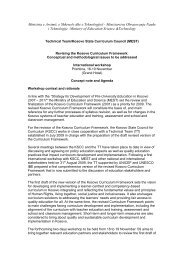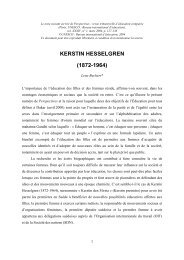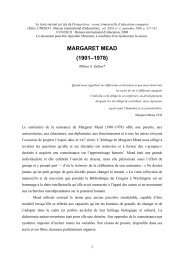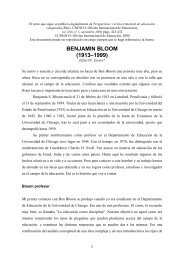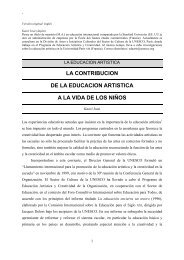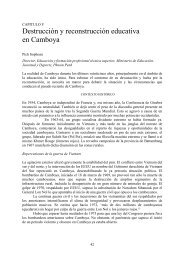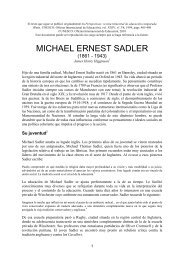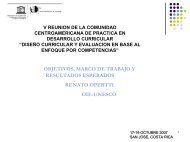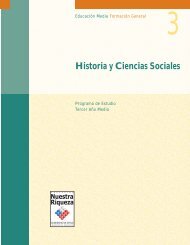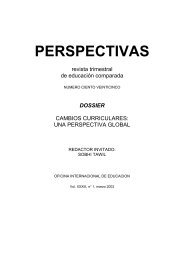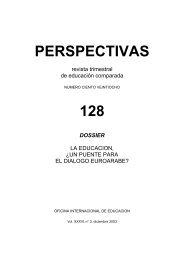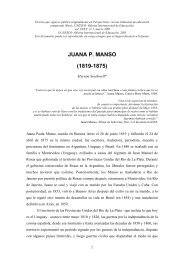MISKAWAYH - International Bureau of Education - Unesco
MISKAWAYH - International Bureau of Education - Unesco
MISKAWAYH - International Bureau of Education - Unesco
Create successful ePaper yourself
Turn your PDF publications into a flip-book with our unique Google optimized e-Paper software.
Miskawayh to train young men and boys can bring about benefits which revert to the person so<br />
trained.<br />
From another angle, training (or education) can be regarded as realizing specified aims,<br />
equally whether this be from the viewpoint <strong>of</strong> the one who assumes responsibility for it, or <strong>of</strong><br />
the one subjected to it. To clarify this, we can present Miskawayh’s own explanations, to extract<br />
from them the aims that can be directed to this business <strong>of</strong> training. Miskawayh says:<br />
These good manners, which are useful to boys, are likewise useful to older people; but they are more useful to the<br />
young, because they habituate them to the love <strong>of</strong> virtues and so they grow up accordingly. Then it is not hard for<br />
them to avoid evils, and later it is easy for them to follow all the prescriptions <strong>of</strong> wisdom and the regulations <strong>of</strong> the<br />
Law (shari c a) and Tradition (sunna). They become accustomed to keep themselves from the temptations <strong>of</strong> wicked<br />
pleasures; they restrain them from indulging in any <strong>of</strong> those pleasures or thinking too much about them. They make<br />
them desire the high rank <strong>of</strong> philosophy and promote them to the high matters described at the beginning <strong>of</strong> this<br />
work, such as seeking proximity to God the Most High, and being near to the angels. They will also be favoured in<br />
this world, with a pleasant life, and a fine reputation. Their enemies will be few, many will praise them and seek<br />
their friendship, especially the virtuous. 32<br />
From this text, which is repeated in various forms in the Tahdhib, we can deduce more than one<br />
aim for refining and training in Miskawayh’s view. Indeed, it can be said that these aims include<br />
some which are temporal, for this earthly life, and some which are concerned with the time after<br />
death, with the eternal abode. Each is interconnected.<br />
That which is connected with training and avoidance <strong>of</strong> evils, and exercise <strong>of</strong> the soul,<br />
and following what the Law and Tradition define, and what wisdom prescribes: all this together<br />
leads to a goodly condition in this world, and a pleasant life, and a fine reputation; this is<br />
clarified in what actually happens, by way <strong>of</strong> having few enemies and many who praise him and<br />
seek his friendship and company. Thus, the practical aim attached to this earthly life, and<br />
resulting from the refinement <strong>of</strong> character, is bringing about the human being’s adaptation to<br />
those around him: and this is exemplified in his conduct and his relationships with them. If he<br />
conforms with this, continues in it, and his knowledge becomes true and his action correct,<br />
‘sufficiency lies not in the knowledge <strong>of</strong> virtues, but in acting with them’, as Miskawayh<br />
continually determines. 33 When the human being really acts in accordance with his knowledge,<br />
this demonstrates that he has reached the rank <strong>of</strong> the wise, or what can be expressed as the<br />
highest point <strong>of</strong> perfection in humanity. 34 The human being’s personal effort in seeking<br />
knowledge, and in his work and his conduct, leads him to be: ‘the happy, the perfect, seeking to<br />
come close to God the Most High, the loving, the obedient, and worthy <strong>of</strong> his friendship and<br />
love’. 35<br />
Since in Miskawayh’s opinion, and as he says, also in Aristotle’s, God is ‘the Wise, the<br />
Happy, the Perfect in wisdom; He is loved only by the happy and the wise, for a being is only<br />
happy with its like’. Hence, whoever approaches God and so earnestly seeks His favour, ‘God<br />
loves him and brings him close to Him, and he will be worthy <strong>of</strong> His friendship’. 36 Whoever<br />
approaches God, and God brings him close, becomes in this way supremely happy, with a<br />
happiness that cannot be surpassed. 37<br />
This is the final aim <strong>of</strong> man’s journey through life, the conclusion <strong>of</strong> his work and his<br />
service here; and his striving to purify his character, as Miskawayh prescribed, and presented to<br />
others who desired his knowledge, in the hope <strong>of</strong> being helped to realize it.<br />
By this definition <strong>of</strong> the final aim, there must perforce be the means enabling it to be<br />
reached; and consequently leading questions can be put, concerning the method <strong>of</strong> the<br />
upbringing <strong>of</strong> human beings in the way which helps them to fulfil this aim; and following on<br />
what Miskawayh said, the reply to this requires concern for the training and refining <strong>of</strong> souls;<br />
thence it is possible to begin by acquaintance with the souls <strong>of</strong> the young men and boys, and the<br />
factors influencing them, or what we could call in today’s language ‘Human nature and the<br />
7



